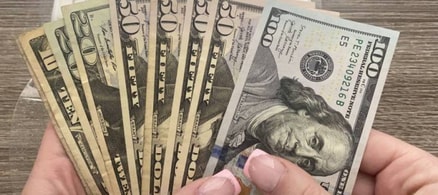Bacon
The word bacon was first used to mean money around 1906, according to The Online Etymology Dictionary. The expression “bring home the bacon,” which is another way of saying “supplying the resources needed to maintain a certain standard of living,” also hints at working-class origins: because of it being cured and “shelf stable,” it was long the staple meat of rural and blue-collar workers.
Use it in a sentence: “I work two jobs because I got to bring home the bacon somehow!”
Kiss Your Credit Card Debt Goodbye
Having a single loan to pay off makes it easier to manage your payments, and you can often get a better interest rate than what you might be paying on credit cards and car loans.
Fiona is an online marketplace offering personalized loan options based on your unique financial situation.
When you consolidate your debt with a personal loan, you can roll your payments into one monthly installment. Find a lower interest rate and pay down your debt faster today.
Get StartedBenjamins/Dead presidents
“Benjamins” derives from the face of Benjamin Franklin, which has been printed on every single $100 bill since 1914. But its entry into the cultural lexicon comes from an unlikely source. In 2004, United Press International reported that the Oxford Dictionary had added “benjamins” to its list of official words, crediting both inspiration from Black vernacular, but also Sean “P Diddy” Combs in particular, for his chart-topping hits “One More Chance” — which was recorded by rapper Biggie Smalls — and “All About the Benjamins.”
Use it in a sentence: “I just dropped five Benjamins on a new suit.”
Boodle
According to The Online Etymology Dictionary, boodle hit American conversations in the year 1833 as a synonym for “crowd.” By the 1850s, the meaning had morphed to ill-gotten gains. It peaked in popularity around 1892.
It originates from the Dutch "boedel," meaning property, or riches.
Use it in a sentence: “It doesn’t feel right spending this boodle, especially considering where you got it from.”
Stop overpaying for home insurance
Home insurance is an essential expense – one that can often be pricey. You can lower your monthly recurring expenses by finding a more economical alternative for home insurance.
SmartFinancial can help you do just that. SmartFinancial’s online marketplace of vetted home insurance providers allows you to quickly shop around for rates from the country’s top insurance companies, and ensure you’re paying the lowest price possible for your home insurance.
Explore better ratesBuck
Buck was first used around 1853. Most likely, its etymological root is “buckskin,” which appeared around the 1300s. Buckskin was a popular item of trade between First Nations people and settlers in the mid-19th century.
Use it in a sentence: “This busker is great, let’s give him a few bucks.”
Cash
Cash first showed up in the 1500s, according to Business Insider India, and it can be traced back to French (the word “casse” means case or box) or Latin (“capsa,” which means case or coffer), both containers that you keep money in.
Use it in a sentence: “I never carry cash on me anymore.”
Cabbage
The origins of the word “cabbage” as slang for money are a bit murky, but the clearest explanation comes via The Huffington Post, which pins its usage to the Mafia’s effect on pop culture. The Post explains that the mafia had a whole vocabulary of food words (bread, dough, lettuce) that were coded to mean money.
Use it in a sentence: “I’m going to have to use my card, I’m all out of cabbage.”
Cheese / Cheddar
Business Insider India pegs this cheesy term to the welfare packages handed out to U.S. residents during World War II. The packages were meant to off-set government rationing, and since they included the infamous Day-Glo orange “government cheese,” (a source of protein meant to replace meat), to “receive your cheese” meant to receive your benefits. The tangerine hue of American cheese also influenced the adoption of the synonym “cheddar.”
Use it in a sentence: “You still haven’t cashed your birthday check? You need to get that cheddar before it expires!”
Clams
“Clams,” historically, have a specific numerical value. One clam is equivalent to one dollar. The Yosemite Library digital archive of the book “Handbook of Indians [sic] of California,” written in 1919, says that the Miwok tribe out of California used clamshells as currency.
Use it in a sentence: “I only have 53 clams to my name right now.”
Dinero
Dinero is a slang term for money that comes from an actual currency. In 1835, it was being used in Peru as one tenth of a sol, which remains the official currency of the country. Prior to its use in Peru, though, it was also used in Spain, and even further back, in Rome, where the Latin prefix of the word dinero, “deni,” was short for “denarius nummus,” which meant the coin containing ten.
Use it in a sentence: “She’s been earning mucho dinero from her Etsy store.”
Dough / Bread
The Online Etymology Dictionary says that dough was first used as a synonym for sustenance in the 12th century. “Breadwinner,” with bread meaning one’s livelihood, was in use as of 1719. Its direct correlation to money arrived around the 1940s.
Use it in a sentence: “That’s a lot of dough to spend on takeout for someone who just quit their job.”
Fin
Fin has its roots in Hebrew and Yiddish, and according to Currency Exchange International, reached its peak as a popular term for money in the 19th and early 20th centuries. The Online Etymology Dictionary points out that both “fünf” in German and “fin” in Yiddish mean “five.”
Use it in a sentence: Q. “How much money do you have in your wallet right now?” A. “Just a fin and some change.”
Greenback
The origins of the nickname “greenback” dates back to the 1770s, when U.S. money started being printed using green ink. Before the Civil War of 1860-65, greenbacks were set up as the opposite of a Texas state currency called “redbacks,” which were printed (using red ink) briefly between 1839-40 and were valued at 37 cents on the dollar.
Use it in a sentence: “Hey friend, do you have a couple of greenbacks I could borrow?”
Loot
In 1802, a military dictionary written by Charles James defined loot as “an Indian word, meaning plunder taken from the enemy.” Interestingly, its use as a noun/replacement for money has only picked up speed in the 20th and 21st centuries. The Columbia Journalism Review says that “loot” arrived in the lexicon as a synonym for “goods” around 1839, but that it only became equated with “money” in 1943, inspired by Scottish slang for what workers received on payday.
Use it in a sentence: “Congratulations on your promotion! Think of what you'll be able to do with all that extra loot!”
Moolah
Moolah’s origins are a bit tricky to pin down. The Online Etymology Dictionary’s definition states that it became a popular colloquialism for money in the 1920s, but admits its roots are vague. Dictionary.com reports a theory that moolah comes from the Spanish word for “mule,” which was historically used as a form of currency in that part of the Mediterranean.
Use it in a sentence: “This moolah is burning a hole in my pocket.”
Quid
“Quid” is the nickname used by Brits, Australians and New Zealanders when referring to the pound sterling. Dictionary.com dates its usage to the 1600s and guesses that the term may have been inspired by the Latin phrase quid pro quo, which means “one thing in place of another.”
Use it in a sentence: “I bring home £450 quid a week, before tips.”
Sawbuck
Sawbuck came to be a slang term for money from how the construction industry’s “sawhorse” looked like an ‘X’ from afar. The ‘X’ was the Roman numeral for 10, and when $10 bills were first being printed in the mid-19th century, the Roman numeral X was featured all over the bills.
Use it in a sentence: “Here’s a sawbuck, buy yourself a sandwich.”
Shekels
According to the Online Etymology Dictionary, shekels were the chief silver coin used by the Hebrews in the 13th century, with the modern term taking shape in English as of the mid-16th century. It seems to have its implied meaning suggested by its weight, which according to Science Direct was between 8 and 15 grams. It was fully in use as a slang term for money by the 1870s.
Use it in a sentence: “I have got to hold onto my shekels until next pay day.”
Simoleons
The Oxford English Dictionary thinks that the term “simoleon” (which peaked in popularity in the late 19th century) comes from a mixture of two words: the British term “simon,” which became a synonym for the sixpence coin in the 1700s; and the French “napoleon” — what they called their currency during the reign of Napoleon Bonaparte.
Use it in a sentence: “I only go to the casino when I have simoleons to burn.”
Smackers
Smackers is American slang — showing up in casual conversation around 1918, according to the Online Etymology Dictionary. The OED suggests that the term may have come from the sound money makes when it is “smacked” into one’s palm. The slightly more ridiculous sounding “smackeroo” developed around 1939.
Use it in a sentence: “Can you believe I only paid $700 smackers for this motorcycle?”
Sponsored
Follow These Steps if you Want to Retire Early
Secure your financial future with a tailored plan to maximize investments, navigate taxes, and retire comfortably.
Zoe Financial is an online platform that can match you with a network of vetted fiduciary advisors who are evaluated based on their credentials, education, experience, and pricing. The best part? - there is no fee to find an advisor.







